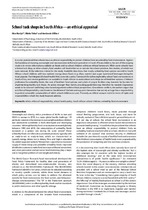School tuck shops in South Africa—an ethical appraisal
Abstract
It can be postulated that schools have an ethical responsibility to protect children from an unhealthy food environment. Against
the backdrop of stunting, overweight and micronutrient deficiencies prevalent in South African children, the aim of this scoping
study is to review information available on foods sold to school children within an ethical framework. While some schools have
a formal tuck shop, at other schools, food vendors sell food either on or outside the school premises. Ten studies, of which two
were national, fit the selection criteria for this study. Available data show that mostly unhealthy food options are sold to South
African school children; with low-nutrient energy-dense foods (e.g. chips, sweets) and sugar sweetened beverages being the
most popular. The Integrated School Health Policy provide a policy framework for achieving healthy school food environments in
South Africa, and several guidelines are available in South African to assist school tuck shops to sell healthier options. Children’s
preference for unhealthy foods, the cost of healthier food options and a lack of proper facilities may however be barriers for
implementing healthy tuck shops. An action stronger than merely providing guidelines may therefore be needed. Cognisance
needs to be taken of conflicting value based arguments within ethical perspectives. Given these conflicts, the authors argue that
an Ethics of Responsibility contributes to the debate of the best and supports the notion that society at large has a responsibility
to protect vulnerable communities of which school children are part. Presently an ethical vacuum exists in terms of rights and
responsibilities which this study hopes to address.

